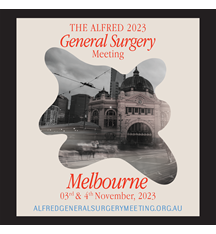2023 | Volume 24 | Issue 4
It will take time, effort and a shared commitment to identify and eliminate racism in surgery. RACS policy says that racism is never acceptable but a policy needs action for it to have meaning and all surgeons have a role to play.
RACS anti-racism working group was formed to help the College bring life to RACS policy position and support the surgical community to better understand and act on racism.
“If we don’t understand and acknowledge racism, we can’t do anything constructive about it,” anti-racism working group Chair, Dr Mark Frydenberg said.
“We all have to be willing to get out of our comfort zones and take our responsibility seriously, or nothing will change.
"Eliminating racism is central to a culture of respect, and won’t happen without effort," he said.
Participants in the 2021 independent evaluation of RACS work to build respect and improve patient safety in surgery told the College that it was time to act on racism. The subsequent findings of the 2022 Medical Training Survey add impetus to RACS actions to address it.
“The Medical Training Survey found 14 per cent of Trainees had witnessed racism and eight per cent have experienced it,” Dr Justin Parr, RACSTA Chair, said.
“Surgical Trainees are reporting high rates of burnout. Anything that can improve training—including addressing racism—has to be championed.
“Whenever we see racism we have a duty to our patients, colleagues and community to call it out,” he said.
RACS is addressing racism at individual and systemic levels. Through training and information, the College is supporting surgeons so they can more effectively address interpersonal racism and the unacceptable behaviour of individuals in workplaces.
In the interest of patient safety and wellbeing of our workforce, the profession also shares a broader, collective responsibility to recognise and dismantle the structures and processes that perpetuate racial stereotypes, prejudice and inequity.
Racism can be difficult to recognise; it can be conscious or unconscious and it is embedded in many of the systems and structures that privilege particular groups, at others’ expense.
It takes many forms, all of which are harmful. Racism is the belief that different races have distinct personalities, behaviours and/or morals that distinguish them as superior or inferior to another. Acting on racist thoughts leads to both conscious and unconscious discrimination. Its impact varies with everyone who experiences it. Its effects have been described as distinct and not felt equally .
One surgeon who asked for their name to be withheld, said we need a shared understanding that racism is widespread among all races, ages and cultures.
“We need to get away from racism as being something directed to a minority and see it as a ubiquitous two-way street,” the surgeon said.
People who experience racism report a wide range of impacts that can include feeling upset, excluded, humiliated, rendered invisible, undervalued, and shaken to their core. Individuals may experience racism or be adversely affected by racial comments or stereotypes.
In the workplace, racism takes many forms, from inappropriate comments about the race of a peer or other health care worker or patient in the theatre, staff room or meeting room, through to exclusion because of race, or unfavourable treatment due to practices or processes that treat people less favourably because of their race.
There are many possible responses to racism, whether you witness it, experience it, or are challenged to reflect on your experience with it.
Familiarise yourself with the information contained in RACS new resource Recognising and responding to racism in the workplace.
Know what to do or where to turn for assistance if:
• you witness or experience racism
• you are involved in the training or supervision of RACS Trainees and become aware of or witness racism towards your Trainee
• someone raises concerns about your behaviour with you.
The RACS Support Program, delivered by Converge International offers free, confidential support to Fellows, Trainees, SIMGs and their families.
Australia 1300 687 327
Aotearoa New Zealand: 0800 666 367
Visit RACS website to learn more about our Building Respect Improving Patient Safety initiative.



